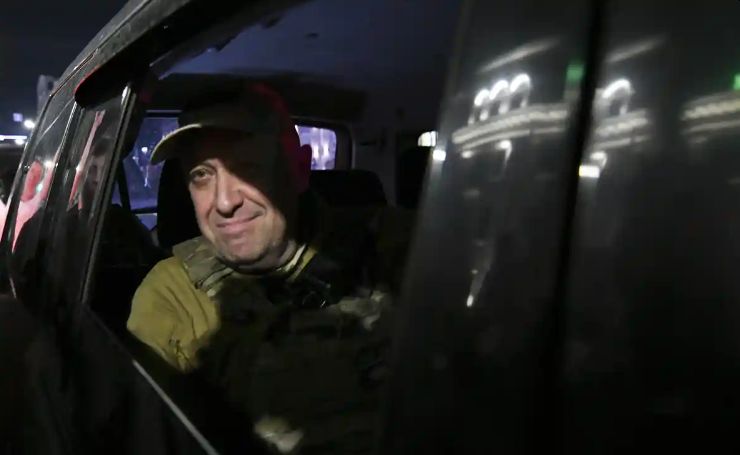By Eric Vandenbroeck
and co-workers
Crisis Abates, But Questions Remain
The Wagner mercenary
group is unlikely to continue as a “Prigozhin-led independent actor in its
current form,” according to the Institute for
the Study of War. The
deal brokered by the Belarusian president would strip Yevgeniy Prigozhin of
control over the group and bring some of it under the Russian Defense Ministry,
the think tank said.
Yevgeny Prigozhin
agrees to move to Belarus after negotiated end to what was, in effect, Russia’s
first armed coup in decades.

One of the more
important battles of the Ukraine war occurred within the Russian government.
Reports over the past several months paint a picture of tension among the
Kremlin, the military, private mercenaries, and oligarchs, even if most of
their differences were kept out of the public eye. That changed on June 23,
when the Wagner Group started its insurrection in southern Russia, demonstrating
that it disagreed with President Vladimir Putin and was ready to defy the
Defense Ministry. This raised questions about whether the insurrection could
upend the government. It didn’t.
Initially, Wagner
took control of Rostov-on-Don. Armored vehicles and detachments of Wagner
cordoned off the headquarters of the Southern Military District, the head
office of the Ministry of Internal Affairs, the local Federal Security Service
building, one of the police departments, and more. Wagner chief Yevgeny Prigozhin
conditioned his release of the city on Defense Minister Sergei Shoigu and Chief
of General Staff Valery Gerasimov meeting him at the headquarters of the
Southern Military District. A contingent of Wagner forces also advanced north
from Rostov-on-Don, past Voronezh, and toward Moscow. Western media, in
contrast to Russian outlets, reported that Wagner had taken control of all
military facilities in Voronezh.
The Kremlin’s
response came quickly. First, it tried to deplete the ranks of the Wagner
fighters, appealing to those involved in the Rostov-on-Don operation to stop
and resume contact with Russian officials as quickly as possible. The Defense
Ministry also announced it aided Wagner fighters who requested a safe return to
their bases. Reports suggest some took the government up on the offer or
returned to their places of deployment after being called up by the ministry.
In response to the
threat to Moscow, the Kremlin expanded the coverage area of its special
anti-terrorist operation to include the capital city, its surrounding regions,
and Voronezh. It also canceled large public events and removed Wagner
advertisements. In St. Petersburg, government security forces cordoned off
Wagner’s building on Zolotaya Street. The government
closed part of the M-4 highway in the Voronezh region. Most notably, Russian
military aircraft reportedly engaged the Wagner forces along the highway.
Meanwhile, Putin
tried to consolidate public support and show strength. In a morning address, he
called Wagner’s actions treasonous and warned that participants in the
rebellion would suffer severe punishment. He also called friendly governments
in the region – Belarus, Kazakhstan, Uzbekistan, and Turkey – to try to
shore up support.
The conversation
between Putin and Belarusian President Alexander Lukashenko was highly
fruitful. Lukashenko mediated talks between Putin and Prigozhin that resulted
in an agreement whose details remain a mystery – except that Prigozhin
announced that Wagner would stop its advance toward Moscow, return to its bases
and try to de-escalate further.
The future of
Russia’s armed forces and Wagner remains uncertain whether or not the situation
is resolved. Wagner played a key role in Russia’s strategy in Ukraine and
repeatedly proved to be among Russia’s most effective fighting forces. It is
unclear whether Wagner will rechallenge Putin in the future or whether there
will be changes in the Russian military leadership. Also unclear is what effect
the insurrection and agreement might have on Wagner and Russian troops in
Ukraine.
A final possibility
is that we have just witnessed a classic Russian “maskirovka,” basically
theater to distract from the fighting in Ukraine. Ultimately, no definitive
casualties were reported, and a negotiated settlement was reached. It took some
wind out of Wagner’s sails, improved Lukashenko’s image, and, in the end,
demonstrated that Putin remains in control of Russia.
For updates click hompage here